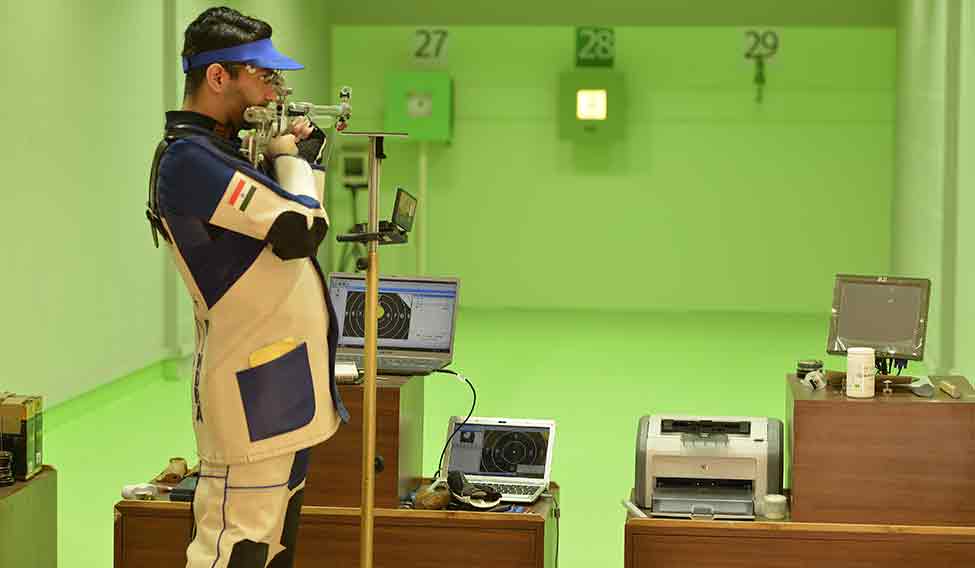Jitu Rai is extremely soft-spoken, and loves to play the flute in his free time. The diminutive Armyman also has an uncanny knack for remaining under the radar, even though he is part of the high-profile Indian shooting team.
Rio 2016 is Rai’s first Olympics. He has, under his belt, eight ISSF World Cup medals (two golds, four silver and two bronze) in free pistol and air pistol events, an Asian Games gold in free pistol and Commonwealth Games gold in 50m pistol. He was the first among his teammates to reach Rio, and began training at the Olympic Shooting Centre four weeks before the first of his competitions comes up on August 6.
A 50m specialist, Rai’s strength is his consistency on the big stage. The 29-year-old, who hails from Nepal, won gold in the ISSF Rifle and Pistol World Cup in Bangkok in March, beating two of the strongest members of the Chinese Olympic team in the final of the 50m pistol event. Then came silver at the 10m air pistol event in Baku in June, where he beat three-time Olympic champion Jin Jong-oh of South Korea.
Rai was hungry for the Baku win, his first in three months. “It was very important for me to learn—how to prepare and approach finals when one had lost the rhythm for the past few months. It is important to know how to handle pressure in finals,” said Rai, as his coach Smirnov Pavel hovered near him like a worried parent.
From 2004 onward, India has won medals in shooting in three consecutive Olympics. It has been the sport on which the government has spent the most. This time round, the Sports Authority of India and the National Rifle Association expect the shooters to win at least two medals.
A major gain for India has been Mairaj Ahmed Khan bagging its first ever Olympic quota in skeet—an event that has traditionally never been India’s forte. Khan, who hails from Khurja in Uttar Pradesh, a place famous for its pottery, surprised all with his Olympic berth.
The squad of 12 shooters is star-studded—a mix of old and new, experience and exuberance. There is former Olympic and world champion Abhinav Bindra, London 2012 bronze medallist Gagan Narang and former world champion trap shooter Manavjit Singh Sandhu. Then there are the young Kynan Chenai, Apurvi Chandela, Ayonika Paul and Gurpreet Singh, who are making their Olympic debuts. Also debuting at Rio are Khan and Prakash Nanjappa, both 40 years old.
The team’s preparations for Rio have been intensive. Each shooter has had the opportunity to choose a training base and a personal coach. While Bindra and Chandela opted to train in Germany and Rio, rifle shooters Narang and Chain Singh trained in Switzerland. Khan and trap shooter Sandhu set up base in Italy, and pistol shooters Nanjappa and Heena Sidhu made Hanover their base. Chenai trained in the US.
Chandela, India’s top 10m air rifle shooter, was the first to book an Olympic berth, after she won bronze in the 2015 ISSF World Cup in Changwon, South Korea. Ayonika Paul, Chandela’s air rifle teammate, had to deal with a training crisis that almost saw her turn into a shooting mess. But she got back on track with the help of Suma Shirur, former world record holder in air rifle, and booked her Rio berth in the last qualifying event held in Delhi last year.
Nanjappa, an engineer who holds an MBA, gave up a cushy job in Canada to return to his hometown, Bengaluru, and chase the unknown as a shooter. A steady rise in the domestic circuit saw him come into his own in 2013, when he won a World Cup medal, followed by silver at the 2014 Commonwealth Games in Glasgow, which he won after battling an attack of facial paralysis. In his own quiet way, he prepared mentally for Rio by picking the brains of the more experienced Bindra and Narang.
Sidhu, 26, is the poster girl of Indian shooting. She became the first female Indian pistol shooter to be ranked world number one in 2014. She is also the first Indian pistol shooter to win gold at ISSF World Cup finals—that, too, with a record score.
Rio is her second Olympics. Despite a very good build-up, Sidhu had finished 12th in qualification in London 2012. Her lack of experience being the main reason. She clinched her Rio berth in the qualifier in Delhi last year, but her 2016 performances in world championships preceding Rio have not earned her a medal. Her husband Ronak Pandit, former national champion, is her coach.
Narang has always been India’s medal hope in major events. Rio is his fourth Olympics, and while 10m air rifle has been his main event, he won the Olympic quota in May last year by winning bronze in the 50m rifle prone event at the ISSF World Cup at Fort Benning, USA. At Rio, he will be participating in 10m air rifle, 50m rifle 3 position and 50m rifle prone.
Narang, 33, has overcome poor form, issues with his rifle and injury to his heel to come to Rio. Critics say competing in three events would be a bit too much for the veteran shooter, but he is confident that he can withstand the pressure. As one of the most seasoned campaigners in the team, he could well prove the critics wrong.












